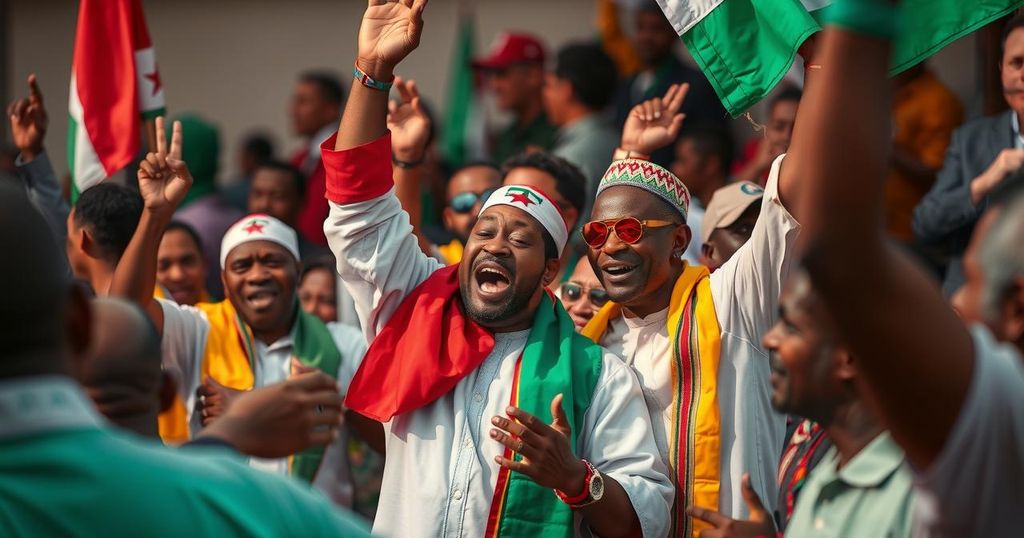World news
2024 ELECTIONS, AFRICA, AHMED BARTCHIRET, ASIA, BOKO HARAM, BURKINA FASO, CHAD, CHINA, COMMISSION, DEBY, ELECTIONS, EUROPE, FRANCE, GOVERNANCE, GOVERNMENT, MAHA, MAHAMAT DEBY, MAHAMAT IDRISS DEBY, MALI, NATIONAL ASSEMBLY, PARLIAMENTARY SEATS, PATRIOTIC SALVATION MOVEMENT, VOTER TURNOUT
Sofia Rodriguez
0 Comments
Chad’s Ruling Party Achieves Majority in Highly Contested Parliamentary Elections
Chad’s ruling Patriotic Salvation Movement secured 124 of 188 National Assembly seats in a parliamentary election marked by opposition boycott, achieving a participation rate of 51.56%. Opposition parties criticized the process, calling it a ‘charade.’ The elections are seen as part of a transition to democracy under President Mahamat Idriss Déby, who took power after his father’s death in 2021, amidst ongoing security threats in the region.
Chad’s ruling party has secured a significant majority in the recent parliamentary elections, amid significant opposition boycott and accusations of electoral invalidity. President Mahamat Idriss Deby’s party, the Patriotic Salvation Movement, reportedly won 124 out of 188 seats in the National Assembly, as disclosed by Ahmed Bartchiret, the head of the electoral commission. The elections, held on December 29, were framed by the government as a crucial step towards democratic transition after years of military rule. Opposition parties expressed skepticism regarding the elections, pointing to a voter turnout of just 51.56% as indicative of widespread disaffection and mistrust of the electoral process.
The December elections, which were the first since 2011, included municipal and regional contests, but faced serious contention from multiple opposition parties. More than ten opposition groups, including the prominent Transformers party led by Succes Masra, chose to boycott the elections, denouncing the process as a “charade.” Critics likened the parliamentary elections to the disputed presidential vote from the previous year, which international observers deemed lacking in credibility. President Deby emphasized that this electoral process would enable a longed-for era of decentralization, intending to devolve power to local governance structures.
The broader political context reveals Chad grappling with significant security challenges, notably threats posed by Boko Haram and the complex implications of military alliances, particularly with France. Recently, Chad initiated a critical reassessment of its military cooperation with its former colonial power, a strategic shift echoed by other nations in the Sahel region that have similarly curtailed ties with France in favor of potential partnerships with Russia. Amid these turbulent developments, government security forces recently thwarted an attempted attack on the presidency, which officials have labeled a serious attempt at destabilization.
Chad has witnessed significant political turmoil since the death of long-serving President Idriss Déby Itno in April 2021, leading to the ascension of Mahamat Idriss Déby as military ruler. The transitional government has been attempting to pivot the country towards a more democratic framework, but this process has been fraught with challenges, including security threats from militant groups and widespread skepticism among the populace and political opposition. The recent parliamentary elections are considered a litmus test of this transition and the government’s legitimacy in facing the complex socio-political landscape. Opposition parties, sidelined by force or legal restrictions, have raised concerns regarding the credibility and transparency of electoral processes, further complicating the political stability in Chad.
In summary, Chad’s recent parliamentary elections have solidified the ruling party’s majority amid a backdrop of significant opposition boycott and allegations of electoral fraud. The participation rate suggests skepticism among the electorate regarding the election’s validity. The political landscape is further complicated by ongoing security challenges and a reevaluation of military alliances. With the government asserting that these elections represent a step towards decentralization, the future of Chad’s political stability remains uncertain as dissent and mistrust persist among opposition groups.
Original Source: www.aljazeera.com




Post Comment